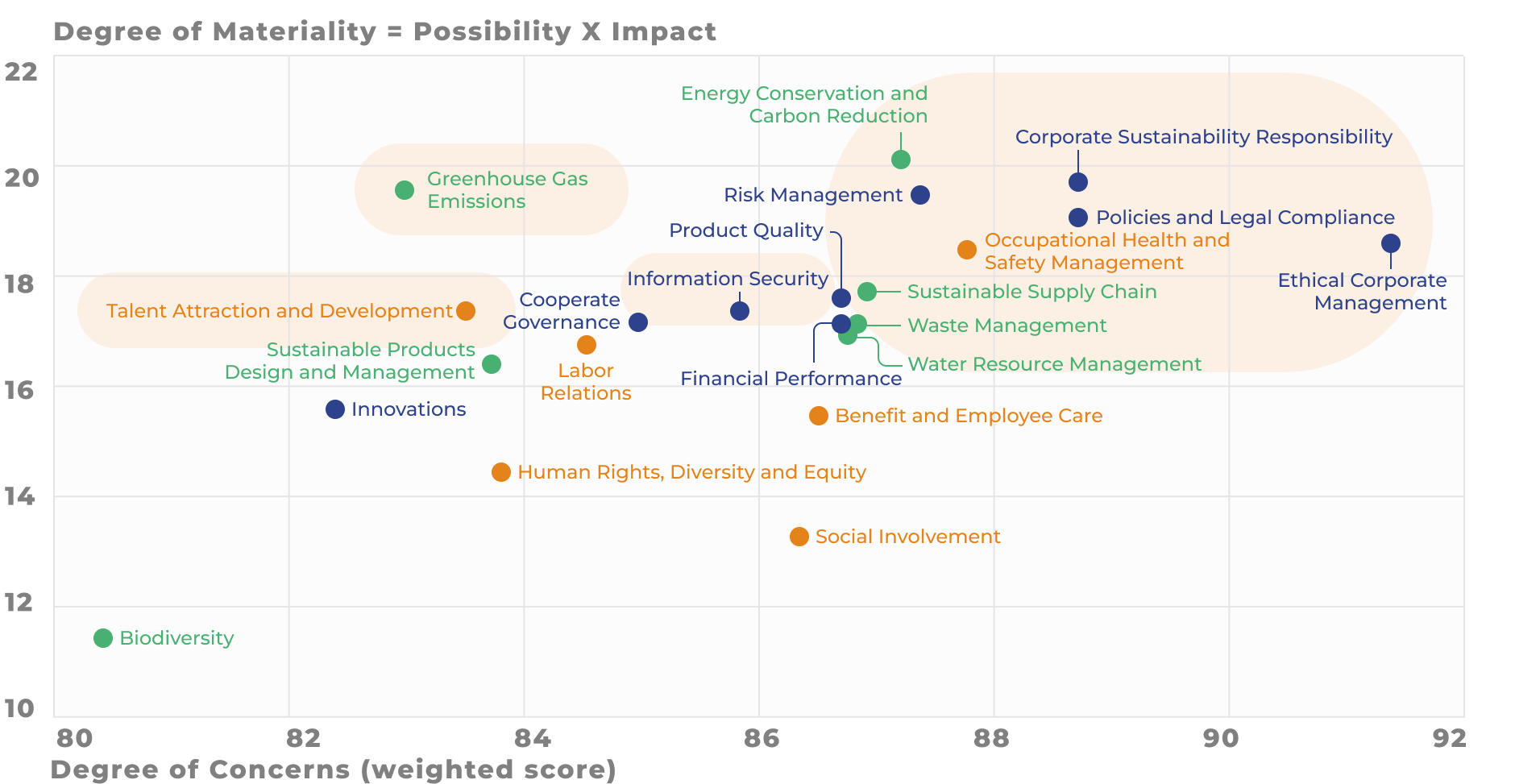Cookie Policy
We use cookies to collect your information for improving the quality of our website and services. To learn more about how we use cookies on this website, please read our Privacy Policy 。
. You may refuse the use of cookies by selecting the appropriate settings in your browser prior to browsing or using this website.
Communication with Stakeholders
CHIMEI values the opinions of all stakeholders. Through establishing diverse communication channels, we actively understand the major issues of concern to stakeholders and incorporate this information into our sustainable development blueprint. We refers to the AA1000 Stakeholder Engagement Standard and defines major stakeholders, including employees, customers, suppliers, investors, financial institution, government, communities/non-profit organizations, media, and trade associations.
Communication Channels
Employees
- Provide diverse communication channels with privacy concerns.
- Establish Occupational Safety and Health Committee.
- Hold a forum for our newcomers.
Customers
- Provide diverse communication channels to meet customer expectations.
- Annually invite customers and suppliers from all over the world to participate in the partner reunion.
Suppliers
- Encourage suppliers to implement EHS and carbon reduction policy.
- Conduct regular on-site audits and annual evaluations, and commend outstanding suppliers.
- Require suppliers to sign relevant documents to identify high-risk suppliers.
Investors
- Regularly publish financial and business information on Market Observation Post System and CHIMEI official website to all investors in real time.
- Annually convene shareholders meeting to disclose material information.
Financial Institution
- Convene regular meetings to explain operating performance and sustainability actions to a group of banks.
- Timely update key events of business through meetings or emails.
Government
- Comply with the requirements of the competent authorities.
- Receive government agencies to visit CHIMEI Green Energy Park and exchange information on ESG issues.
Communities/Non-profit organizations
- Maintain good interactions with communities and NPOs through emails, phone calls or in-person interviews.
- Participate in various charity activities.
Media
- Provide press releases, annual reports, and arrange spokesperson interviews to meet social expectations.
Trade associations
- Participate in various public associations and technical exchange seminars.
- Integrate with the international standards and solidify the foundation of industrial cooperation.

Material Topics
ENVIRONMENT
SOCIAL
GOVERNANCE
Identify and Prioritize
For evaluating material topics, we used international sustainability standards such as the GRI Standards (Global Report Initiative) and conducted quantitative assessments through questionnaire for Stakeholders. This measured the concern and impact significance of various topics, prioritizing results statistically, and resulting in the matrix diagram of material topics. After discussions by the CHIMEI Sustainability Office and the Sustainability Committee Work Team, the topics of "Greenhouse Gas Emissions," noted for significant materiality, "Information Security," recognized for high negative impacts, and "Talent Attraction and Development," aligned with long-term operational strategy goals, were included. As a result, 10 material topics encompassing the E, S, and G dimensions were identified, including 2 environmental topics, 2 social topics, and 6 economic topics. Among these, "Ethical Corporate Management" and "Policies and Legal Compliance," " Energy Conservation and Carbon Reduction" and "Greenhouse Gas Emissions" were managed jointly. After discussions and reviews by the Sustainability Office, Sustainability Committee Work Team, and external consultants, the relevance of the material topics was confirmed and approved by the highest governance body. These topics are covered in the 2023 Sustainability Report, showcasing CHIMEI Group's policies and performance results.
STEP 1 Impact Assessment
- Focusing on international sustainability standards and regulations (GRI Standards, SASB, SDGs, TCFD, EcoVadis, UN Global Compact), issues from industrial chain partners, peers, stakeholders and internal development goals, the Sustainability Office and the Sustainability Committee Work Team collaboratively discussed and compiled 22 ESG issues.
- We collected opinions on the degree of concern from stakeholders through the "Stakeholder Concern Questionnaire," receiving a total of 1,143 completed questionnaires.
- We conducted an impact assessment through the "Stakeholder Materiality Questionnaire" completed by senior managers and colleagues involved in sustainability efforts, collecting a total of 69 completed questionnaires.
STEP 2 Material Topics Identification
- After analyzing the results from the "Stakeholder Concern Questionnaire" and the "Stakeholder Materiality Questionnaire," the topics were ranked according to the quantified values.
- We entrusted external consultants to jointly review and verify the appropriateness of the identified material topics and threshold standards. Then, the Sustainability Office and the Sustainability Committee Work Team adjusted the material topics to ensure they were complete, inclusive, comprehensive, and aligned with our sustainability strategy.
- In 2023, a total of 10 material topics were identified.
STEP 3 Material Topics Confirmation
- Confirmed by senior management and approved by the highest governance body.
- In the 2023 Sustainability Report, we disclosed the impacts of each material topic and our company's corresponding policy commitments, management approaches, targets, and relevant performance.
Matrix of Material Topics
- Environment
- Social
- Governance
- Material Topics

Impact of Material Topics
1
Ethical Corporate Management
Policies and Legal Compliance
2
Energy Conservation and Carbon Reduction, Greenhouse Gas Emissions
3
Corporate Sustainability Responsibility
4
Risk Management
5
Occupational Health and Safety Management
6
Sustainable Supply Chain
7
Information Security
8
Talent Attraction and Development
Upstream: Petrochemical industry, refers to suppliers and contractors. CHIMEI: CHIMEI Group, including employees and investors. Downstream: Plastics and rubber industry, refers to customers.
Questionnaire of Material Topics for Stakeholders
CHIMEI publishes sustainability reports annually to disclose the goals and performance of material topics. In order to align the concerns of stakeholders and communicate effectively, we sincerely invite you to fill in “Questionnaire of Material Topics for Stakeholders.” The results will help us understand the materiality of every topics, form the information disclosure in sustainability reports, and become the key reference of our sustainability policies and goals. (We collect the valuable opinions of our stakeholders during the first quarter of each year.)
About CHIMEI
CHIMEI is a Taiwan-based performance materials company that designs and manufactures advanced polymer materials, synthetic rubbers, and specialty chemicals.
Copyright © CHIMEI. All rights reserved.